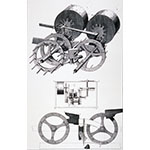Blaise Pascal (1623-1662) invented the first fully mechanical calculator in 1642. The pascaline, as it became known, was a compact device that could perform addition, subtraction, and—using a more mechanized process—multiplication and even division. The lack of market demand and the cost and difficulty of producing the components account for the meager success of the pascaline, of which only about twenty units were built.








